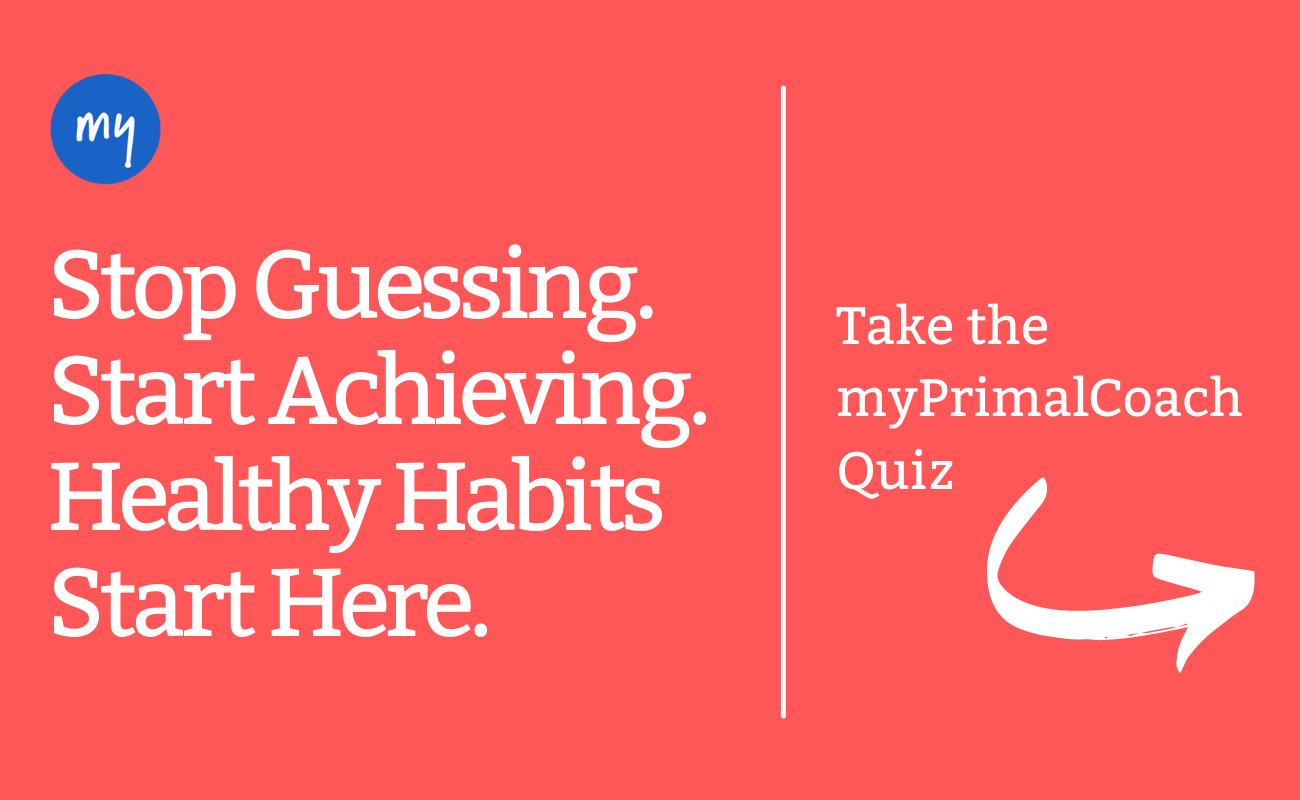From Vegan to Pegan, Gluten-Free to Intermittent Fasting, Paleo diet to Keto, and Mediterranean to Nordic—there seems to be new diet trends popping up every year with grand promises of health, weight loss, and then some! This year is off to a bit of a different start. What’s the underlying theme among all the popular diet trends in 2022? Personalization. There’s a general movement away from diet culture and a movement toward figuring out what works for you as an individual—a core value of the primal lifestyle! Let’s take a deep dive into the pros and cons of this year’s popular diet trends.

1. Continuous Glucose Monitors
Odds are you’ve encountered someone wearing a continuous glucose monitor (CGM) or come across an advertisement at this point. Quickly gaining traction in the wearables community, CGMs are being touted as an invaluable tool to track health data.
Traditionally a device for diabetics that requires a physician’s prescription, CGMs now appeal to biohackers looking to gain insight into their blood sugar regulation and optimize their health.
CGMs provide instant data by measuring the level of blood glucose in your tissue fluid via a sensor typically inserted in the upper arm. The readings are sent wirelessly to your smartphone and access to the data is available through an app that is updated every few minutes. Whether or not you’ve seen one, you may be wondering what they are and if you should hop onboard this trend:
Pros
- Personalized data allows you to explore your optimal way of eating. There is no one perfect diet for everyone and people have different levels of insulin sensitivity dependent on a multitude of factors. A CGM allows you to decipher how certain foods and lifestyle factors (e.g. sleep, stress and exercise) impact your blood sugar.
- Real time data offers information that may otherwise be missed. Having insight into your blood sugar around the clock allows for a much bigger picture than an annual blood test. A recent study showed many individuals considered non-diabetic by traditional measurement standards demonstrated high glucose fluctuations via a CGM, with some reaching a pre-diabetic range.
- Behavior modification may result from witnessing a correlation between what you consume and how you feel, heightening accountability and motivation. A tool that offers immediate access to the implications of your choices may lead to less mindless eating and other adverse behaviors. A recent study found that 87% of CGM users felt that they modified their food choices based on use.
Cons
- There is a potential risk of hyper-focusing on the data and aiming for flat glucose levels as often as possible. This may lead to restricting otherwise healthy foods that cause a temporary spike in blood glucose. A well-rounded mix of all food groups is fundamental to healthy eating.
- There is a lag in data collection when utilizing tissue fluid to measure glucose levels. The transportation of glucose from the blood to the tissue takes 15-20 minutes. This lag should be taken into account if the levels of glucose greatly fluctuate.
- There is also reported inaccuracy of overnight data collected from CGMs due to sleeping positions. Readings varied more than 25mg/dl due to inhibited local blood flow from tissue compression. Such fluctuations may impair accuracy of daily blood glucose averages.
2. Electrolyte Powders
Electrolytes are minerals in your blood and other bodily fluids that carry an electric charge. They have many effects on your body’s basic functions including the amount of water in your body, the acidity of your blood, and muscle function. Common electrolytes are magnesium, sodium, and potassium. In order to function properly, your body needs to maintain a proper electrolyte balance. More and more powdered electrolyte supplements are popping up on the shelves lately. Meant to be mixed with water or other drinks, you may be wondering what the benefits are:
Pros
- Electrolyte drinks can help replenish your body with essential vitamins and minerals during strenuous, long-duration exercise or after exercise in hot environments.
- Electrolytes can be helpful for rehydration during illness, such as vomiting and diarrhea, when fluids are lost.
- Electrolyte powders are lightweight and portable—an easy option to throw in your gym bag or take with you on a long hike.
Cons
- There are risks to consuming too many electrolyte drinks. Having more than necessary levels of calcium, sodium, and potassium in the blood can be dangerous. Be sure to consult your doctor before adding an electrolyte supplement to your diet.
- Many convenient electrolyte supplements and powders are loaded with sugar and even caffeine. Be sure to read labels for hidden ingredients.
3. Intuitive Eating
At the forefront of the anti-diet culture movement is intuitive eating, but what exactly is it and does it work? Intuitive Eating is a non-diet approach to eating. The concept was created in 1995 by two dietitians to promote a healthy attitude toward food and body image. There are no food lists or guidelines. It’s a practice of honoring and trusting your body and its hunger signals. Is Intuitive Eating for you?
Pros
- One of the major benefits of intuitive eating is better psychological health. Studies show participants in intuitive eating improved their self-esteem, body image, and overall quality of life while decreasing depression and anxiety levels.
- Intuitive eating has a good retention rate. People are more likely to stick to the program than with a more restrictive diet.
Cons
- More than 120 million Americans have diabetes or pre-diabetes. According to the CDC, 1 in 10 Americans have diabetes and 1 in 5 don’t know they have it. More than 1 in 3 have pre-diabetes and more than 8 in 10 don’t know they have it. Given these statistics, education and awareness of healthy living practices may also be beneficial for many.
- In addition, a recent study found autoimmunity rates are on the rise. There is a proven link between food additives, including sugar and gluten, and intestinal permeability—which is common in multiple autoimmune diseases. Remaining cognizant of ingredients in the food we are consuming is wise.
- Intuitive eating is not linked to weight loss if that is a health need or goal.
4. Ashwagandha
Ashwagandha is a traditional Ayurvedic herb that has been used for its healing properties for centuries. The term ashwagandha is derived from a Sanskrit word, “odor of the horse”, and may not sound too appealing at first. However, once you learn of its benefits, you just may change you mind. Ashwagandha can:
Pros
- Reduce chronic and acute inflammation.
- Act as a potent anti-carcinogenic.
- Protect against stress and lower cortisol levels.
- Aid in thyroid function, improve fertility and semen quality, stimulate muscle development, and assist in treatment of neurological disorders.
Cons
- Ashwagandha can directly irritate mucosal lining and when taken in large amounts may lead to digestive upset, diarrhea, nausea, and vomiting.
- Ashwagandha is not regulated by FDA. Anyone interested in using ashwagandha should talk to their doctor before incorporating it into their health regimen.
5. Personalized Online Coaching
Individuality is the theme of this year and nothing demonstrates that better than the rise in popularity of custom virtual health and nutrition coaching. Whether it’s a tracking app, one-on-one meetings, or educational lessons, there are many options available out there to keep you covered and meet your needs. If you’ve tried every popular diet trend over the years and nothing seems sustainable to you, your own personal coach is probably just what you need:
Pros
- Everybody is different and has different needs. A personal coach offers support specific to you and utilizes their knowledge and skills to help you figure out what that looks like. Are you a “rip the bandaid off” type or need some hand holding and baby steps? A good coach will know the best approach for you.
- It’s a lot easier to show up to an online appointment or meet an online deadline. Any gym-goer knows the value in laying out your workout clothes the night before. You’re much more likely to show up for your workout when you do! The same concept applies to online nutrition and health coaching. You’re much more likely to login than get in your car and commute to an appointment.
- Accountability is the key to success and aids in building habits. A personal coach is your confidante with regular messaging. You’re much more likely to stick to your goals and make progress when you know you know you have someone to answer to!
- A coach provides education and background to their suggestions including handouts and graphics. Knowing the why behind the what may aid in compliance to your plan.
- A coach can collaborate with your other healthcare practitioners to develop a plan for a holistic approach to your overall well-being.
Cons
- Not everyone has the budget to hire a personal health and nutrition coach. The good news is as this trend continues to gain traction, more affordable apps and options are emerging. myPrimalCoach is an online coaching app that provides you with one-on-one access to your own health coach. For a limited time you can get started for only $1 and you can cancel anytime. To learn more, check out myPrimalCoach here and fill out our health questionnaire.
Bonus Content! Trending Structured Diets
It wouldn’t be a popular diet trends article without covering structured ways of eating with specific guidelines. The following diets have been gaining traction over the past few years:
DASH Diet
Created to aid in disease prevention and weight loss, DASH is an acronym for Dietary Approaches to Stop Hypertension. The diet reduces the consumption of saturated fat and sodium while including foods that are rich in potassium, calcium, magnesium, fiber and protein such as fruits, vegetables, whole grains and lean meats. Studies have shown that the DASH diet aids in lowering blood pressure and may contribute to weight loss, though other factors such as exercise and calorie restriction were at play.
Golo Diet
The Golo diet has been gaining popularity over the past few years as a way to manage insulin levels and help people lose weight. This way of eating encourages nutrient-dense foods such as fruits, veggies, healthy fats, and lean proteins while increasing exercise and the inclusion of the company’s supplements. With specified meal plans, this diet may be an effective approach for those that prefer structure, though all studies demonstrating weight loss were small and funded and conducted by Golo.
Flexitarian Diet
The name of this diet tells you everything you need to know—it’s flexible! Mostly plant-based foods and a vegetarian diet, it does allow for meat and other animal products in moderation. The diet calls for limiting added sugars and processed foods and including foods in their most natural forms. Since studies have shown vegetarian diets aid in lowering blood pressure while excluding all animal products may lead to nutritional deficiencies, the Flexitarian diet may just offer the best of both worlds.
Raw Food Diet
Is raw food healthier than cooked food? The jury is still out. This diet calls for eating foods that have never been heated over 104–118°F (40–48°C). They should also be unrefined, unpasteurized, and unprocessed foods. Juicing, dehydrating, blending, and sprouting are common preparation forms with this way of eating. The diet calls for healthy fats such as coconut oil and olive oil, while shunning trans fats and processed foods. Some raw meat, dairy products, and fish may be included as well.
Carnivore Diet
This diet is all about animal products—meat, fish eggs, dairy products (excluding low-fat). Fruits, vegetables, legumes, grains, nuts, and seeds are a no. The aim of the diet is zero carbs. There are no other rules—eat as much and as often as you’d like while staying within the list of foods. Low carb diets have been proven to lead to weight loss, though the restrictive nature of this diet may make it unsustainable for many.
Intermittent Fasting
Fasting intermittently has been around for centuries with many proven health benefits, including improved blood sugar control and weight loss. There are several different types of Intermittent Fasting, including time-restricted eating such as fasting for 16 hours a day, short 2 day fasts, as well as prolonged 30 day fasts. While therapeutic for many, fasting may not be best for others and it is always best to check with your healthcare professional before trying this or any diet.
Summary
As every year brings new health trends, this year it’s all about you and your individual needs. There is no more one-size-fits-all approach to diet and nutrition and the trends are illustrating that. With more and more tools available to figure out your unique and best way of eating, there’s no time like the present to get started on your journey!

